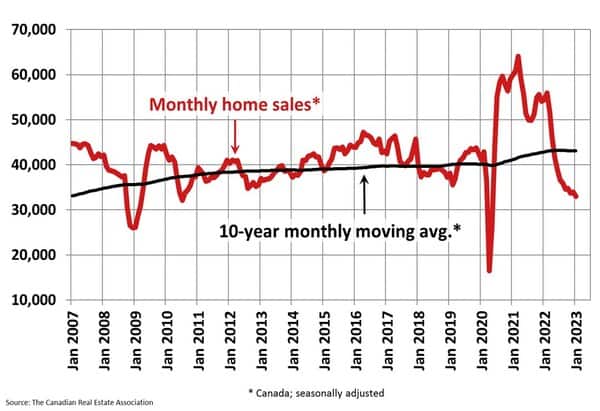The Canadian real estate market has continued its descent below the 10-year average for another month, with sales down three per cent from December to January.
While these holiday months are typically the two slowest months of the year, the last two months have been exceptionally slow for home sales in Canada.
Sustained period of low volume
When examining Chart A from CREA’s stats report, we can see that home sales have entered into a sustained period of low volume not seen since 2009 – the last time Canada saw a major recessionary period.
This period of time has proven tough for many in the real estate industry, with industry earnings suffering as a result of transaction volumes down 37.1 per cent from last year.
Fortunately, based on past cycles in Canadian real estate, large drops in volume are typically followed by a comparable rebound upward. These drops and rebounds can be examined in 2008, 2017, and 2023 on CREA’s monthly home sales chart:

Monthly home sales (Canadian Real Estate Association)
The correlation between price and volume becomes exceptionally clear when looking at how prices evolved during the same periods.
CREA’s MLS Home Price Index (HPI) continued its decline by 1.9 per cent since last month, now down 12.6 per cent year-over-year.
The actual national average home price is down 18.3 per cent from this time last year. This continued drop in price has broken last month’s record, which was the largest annual drop in the price since the global financial crisis.
Based on research from Ben Rabidoux, founder at Edge Realty Analytics Ltd, the drop in price has now exceeded what we saw in the 1990s – Canada’s last major housing correction.
Canadian house prices have now seen the largest cumulative decline from peak since the 1970s pic.twitter.com/iKTmqz8roz
— Ben Rabidoux (@BenRabidoux) February 15, 2023
Toronto and Vancouver
CREA makes note that much of this drop in price is skewed downward by Toronto and Vancouver area data. These more sophisticated markets did seem to behave in an almost forward-looking fashion in response to interest rate hikes – with steep declines in Q2 of 2022 paving the way for these record year-over-year declines.
The forward-looking markets almost behaved as though they were trying to “price in” the entire cycle of rate hikes once the Bank of Canada began. CREA expects the next two months will post the largest year-over-year price declines since most markets peaked in February or March of 2022.
The market seems hopeful that rate hikes are behind us, and the real estate industry is ripe with anecdotes of renewed energy and activity from buyers who were patiently waiting on the sidelines.
Supply and demand
There seems to be growing pressure on 2023’s spring market to floor the price declines and begin the much-needed resurrection of volume, but increased interest rates seem to have stripped the market of urgency.
New inventory continues to be tight, with just a 3.3 per cent increase in new listings month-over-month in January, and 4.3 months of inventory.
This trickle of supply has kept the market away from a state of excess supply, which has aided in slowing further price declines in many markets.

Daniel Foch is the Chief Real Estate Officer at Valery.ca, and Host of Canada’s #1 real estate podcast. As co-founder of The Habistat, the onboard data science platform for TRREB & Proptx, he helped the real estate industry to become more transparent, using real-time housing market data to inform decision making for key stakeholders. With over 15 years of experience in the real estate industry, Daniel has advised a broad spectrum of real estate market participants, from 3 levels of government to some of Canada’s largest developers.
Daniel is a trusted voice in the Canadian real estate market, regularly contributing to media outlets such as The Wall Street Journal, CBC, Bloomberg, and The Globe and Mail. His expertise and balanced insights have earned him a dedicated audience of over 100,000 real estate investors across multiple social media platforms, where he shares primary research and market analysis.
















Ben Rabidoux is not a realtor!
Edge Realty is not a brokerage!
So how do they get access to our stats and information?
Why is subtracting a couple numbers called “research”?
Can REM clarify?
Hi Connie,
Thanks for reading.
CREA shares national statistics on its website monthly and makes the data available for download to the public. This is how REM can report on the information.
In the case of Ben Rabidoux, he is a respected Canadian analyst who has been studying the housing market for years and has built a reputation for his analysis. While he may not be a realtor, his expertise allows him to interpret the data and provide valuable insights.
As for Edge Realty Analytics, they specialize in the analysis of real estate data. They do not operate as a brokerage but instead focus on research and analysis of the real estate market.
Regarding the use of the term “research,” it is important to note that in this context, it refers to the analysis and interpretation of the data, not just the act of subtracting a couple of numbers. The process of analyzing real estate data involves examining trends, patterns, and other factors that affect the market.
I hope this clarifies any confusion you may have had. If you have any further questions, please don’t hesitate to reach out.
jordana@realestatemagzine.ca